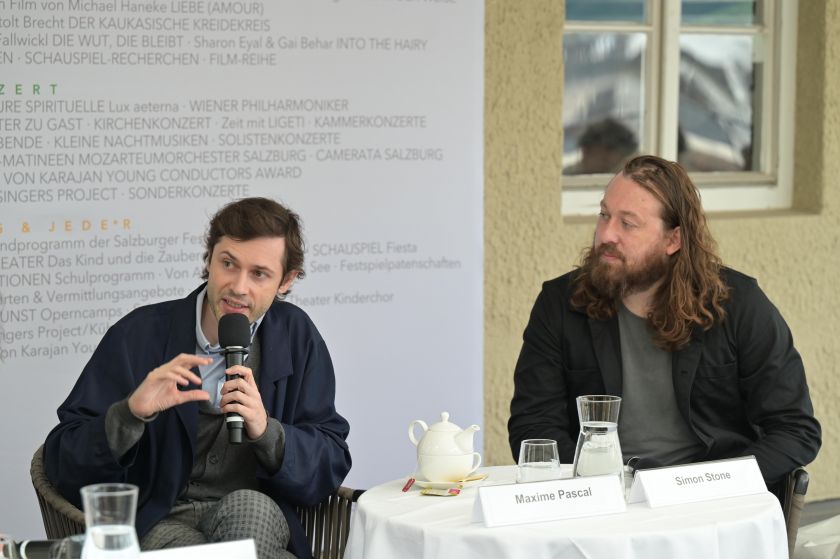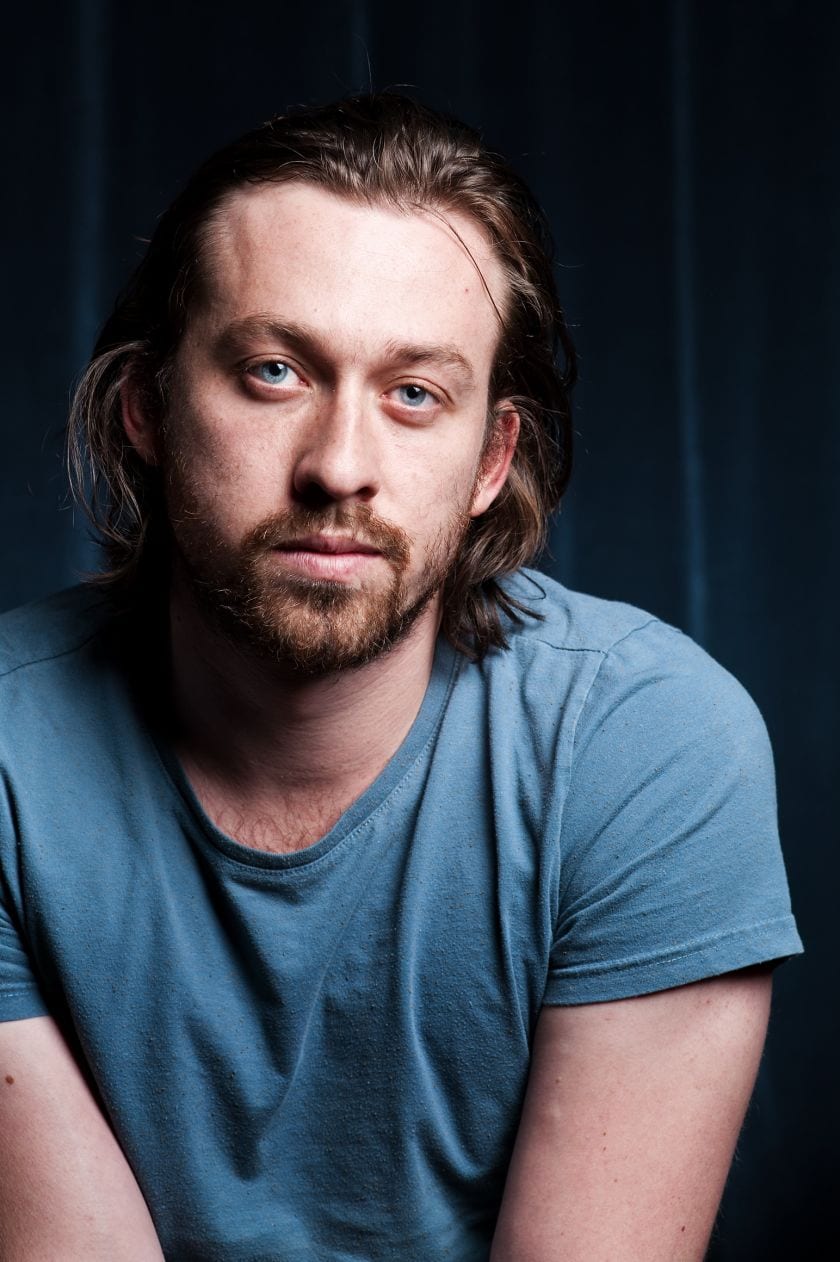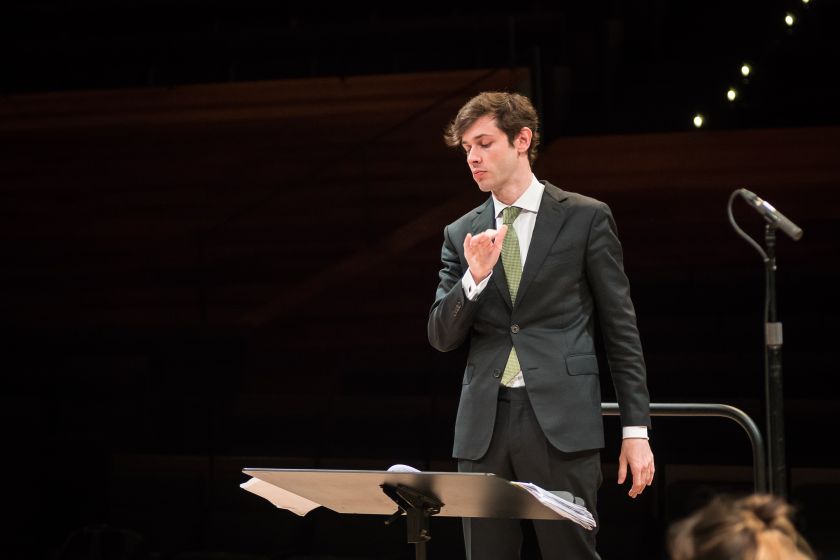How Serious Are We About Charity?
„One would hope it would be more difficult to find contemporary parallels.
Unfortunately, that is not the case.“

Politics vs. religion: in Bohuslav Martinů’s gripping opera The Greek Passion, what begins as a passion play becomes deadly serious.
Easter bells ring out. The entire village is celebrating the resurrection of Christ. And another honour is being bestowed: the priest Grigoris and other dignitaries are selecting the performers for next year’s passion play. The lengthy preparation period is also intended to improve behaviour in daily life. The innkeeper Kostandis, for example, slated to play the disciple Jacob, is instructed to stop watering down his coffee and beating his wife; the merchant Yannakos, who is to play Peter, is told to stop cheating his customers, and so on. The blacksmith Panait can finally be convinced to play Judas: without a traitor, there can be no redemption. And Jesus himself? The young shepherd Manolios does not consider himself worthy. Yet which human would be worthy? Grigoris blesses the chosen ones. When Greek refugees arrive in the village, a rift runs through the community, demonstrating how far the chosen performers have already begun to embody their roles: the strangers have lost everything and are hungry, yet Grigoris and the village elders want nothing to do with their plight. Only the passion players understand that the moment has come to put into action the charity so often preached. Led by Manolios, who keeps identifying more and more with the figure of Christ, they champion the poor and dispossessed. This increasingly turns Manolios into an undesirable insurrectionist. And thus, the biblically inspired tragedy unfolds…
Wartime roots. The Greek village of Lykovrissi in Anatolia in 1922 provided the backdrop for the 1948 novel O Christòs xanastravronete by Nikos Kazantzakis (1883-1957), which was published in many languages as The Greek Passion, while the original title translates more accurately as Christ is Recrucified. Historically, this anchors the action in the final stages of the Greek-Turkish War, which followed World War I: at the time, the fall of the Ottoman Empire caused the Kingdom of Greece and its allies on the one hand and the proponents of a Turkish national state on the other fight for Anatolia. “Ethnic cleansing”, i.e. acts of atrocity, and the resulting movements of numerous refugees, were among the consequences. Kazantzakis, however – who also wrote the novel The Last Temptation, Martin Scorsese’s 1988 film version of which caused significant protest among the Christian faithful – was not aiming to write fundamental criticism of the Christian religion, but rather to expose social injustice and the abuse of power by representatives of church and state. Ultimately, Kazantzakis, who had travelled far in his lifetime, was able to state: “I have been a cooper, a proponent of katharévousa [a newly-constructed academic Greek language], a nationalist, a proponent of dimotikí [the modern Greek vernacular], an intellectual, a poet, a religious fanatic, an atheist, an aesthete – and none of these can ever deceive me again.”
Bohuslav Martinů (1890-1959), born during the reign of Emperor Franz Joseph in Polička in Eastern Bohemia, also led a changeful artist’s life, reacting creatively to many different influences of his time. His family lived almost 40 metres above the city, just underneath the top of St. Jacob’s Church, where his father, a cobbler, improved his meagre earnings as a fire warden. At the age of 19, the highly gifted Martinů was expelled from the Prague Conservatory because of “incorrigible laziness” – only to start composing in an even more carefree and inspired vein. Folk music, impressionism, jazz, polytonality, neo-baroque: all these and more styles were sampled by Martinů for himself, who strove to unite all stylistic epochs of the past in one personal synthesis. After many years in France, the shock of imminent Nazi occupation drove him to the USA in 1941, where he taught at Princeton University and in Tanglewood, before the institution that had once expelled him offered him a professorship in composition in 1946. A grave accident, however, prevented his return to his homeland: Martinů suffered a fall leading to a skull fracture which also had unpleasant repercussions for his hearing. At last this prevented him from having to live under a communist dictatorship. In 1952 he became a US citizen and began dividing his time between Europe and the USA; Martinů’s music had won in clarity and mostly employed a rather diatonic idiom. He spent the last years of his life in Switzerland.

From novel to opera. In 1954, Martinů had met Nikos Kazantzakis in Nice, whereupon he was first interested in turning his world bestseller Zorba the Greek into an opera. The author, however, managed to divert Martinů’s interest to The Greek Passion: Martinů set an English libretto he himself had compiled on the basis of the English translation, because he had hopes for a world premiere at the Royal Opera House Covent Garden under Rafael Kubelík. His catchy, yet never simple tonal language leant on the power and aura of choral singing and sacred music, on folk music allusions, sophisticated mixtures of colours and expressionist exaggerations. It is part of the political implications of the work and the significant shifts occurring throughout its genesis that it was ultimately another conflict between the same parties which made a London premiere seem undesirable: both Greece and Turkey laid claim to the island of Cyprus, then still occupied by the UK. After a fundamental reworking by the composer, the opera was first performed in Zurich in 1961 – almost two years after Martinů’s death. This is the version which will now be performed in Salzburg.
To Simon Stone, the refugees currently arriving in Greece and their suffering prove how topical The Greek Passion has remained: “One would hope it would be more difficult to find contemporary parallels. Unfortunately, that is not the case.” The London-based director is known for anchoring his opera productions within a concrete current scenario: at the Salzburg Festival, he was acclaimed for his production of Aribert Reimann’s Lear and the controversial staging of Luigi Cherubini’s Médée. Now he directs The Greek Passion with a renowned cast led by Sebastian Kohlhepp and Gábor Bretz as Manolios and Grigoris. “We all have xenophobia,” says Stone, “and if an acquaintance suddenly said: I need nothing and no one, I only want to help others – we would consider them crazy.” Apart from the human weakness of only championing good causes as long as one doesn’t have to forego any comforts of one’s own, the director is also fascinated by the ambivalence between passive endurance and active struggle against injustice. He considers the Felsenreitschule the ideal place to stage this story.

Timeless modernism. The Salzburg interpretation of Martinů’s Greek Passion is conducted by Maxime Pascal. Since the young Frenchman won the Festival’s conducting competition in 2014, he has cemented his outstanding reputation as an interpreter of 20th- and 21st-century music here – last summer, he led Arthur Honegger’s Jeanne d’Arc au bûcher and Wolfgang Rihm’s Lenz. He shares Simon Stone’s enthusiasm for Martinů’s music: „Martinů is uninterested in modernistic experiments, but nothing about his work sounds old-fashioned,” the director says: “The music is emotional, but never kitschy.” Pascal agrees: “Martinů displays enormous sensitivity to the text, he listens carefully to the words and the sounds they evoke in him. This kind of sensibility reminds me of Schumann, but also Debussy: it is a manner of composing that delves deep into the subconscious.” The conductor finds another aspect moving: “The fact that performers for the Passion of Christ are selected in this opera is a metaphor for us musicians: our task is to bring great works to life, over and over. Dreams and myths play an enormous role in this work.” Another dream-come-true for Maxime Pascal is his debut working with the Vienna Philharmonic – a myth in its own right. “To me, this marks the beginning of a new era, yet it also continues my childhood, for I have always been familiar with this orchestra and its culture of playing through recordings.”
Walter Weidringer
Translation: Alexa Nieschlag
First published on 20.05. 2023 in Die Presse Kultur Spezial: Salzburger Festspiele 2023
